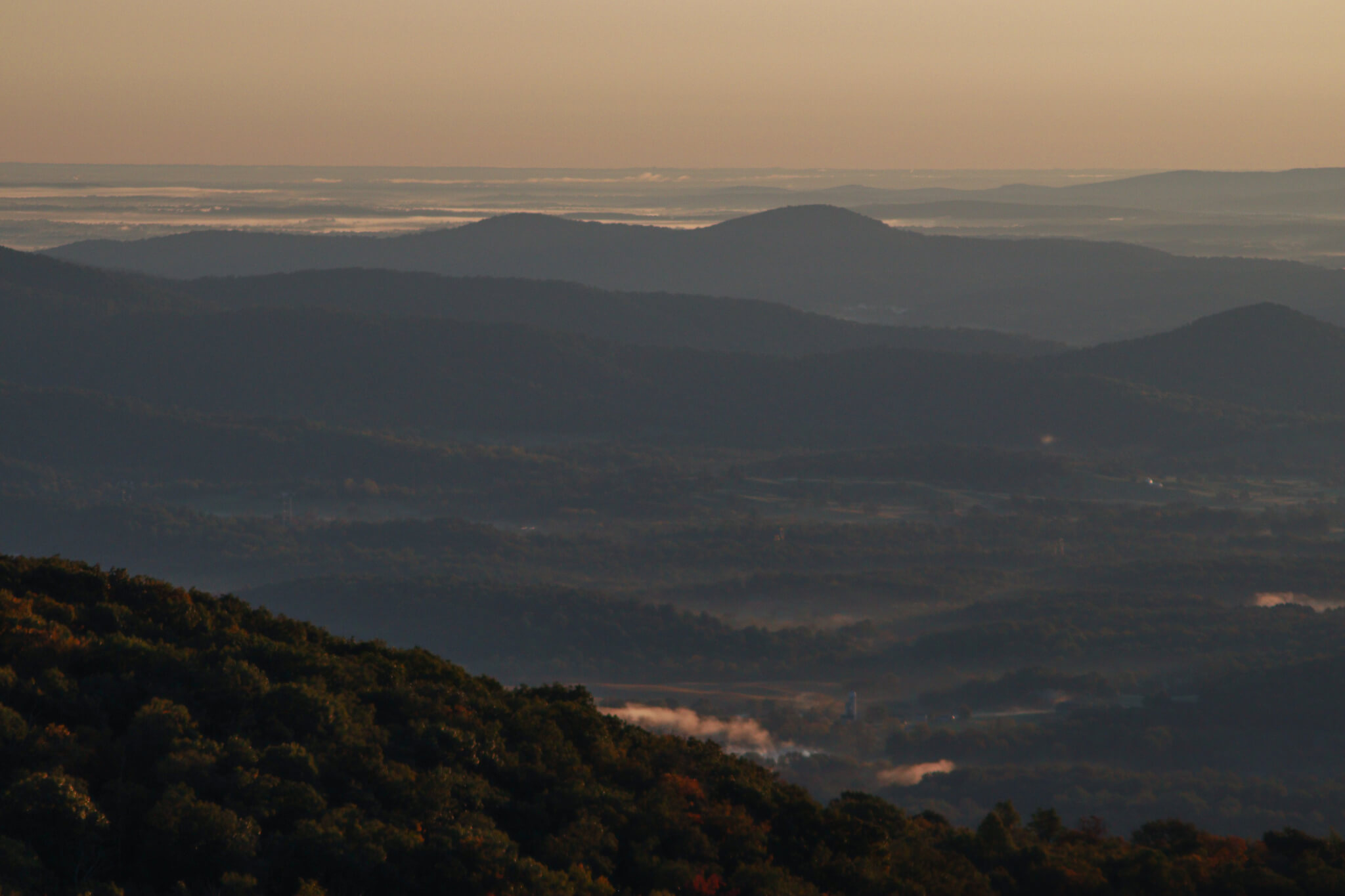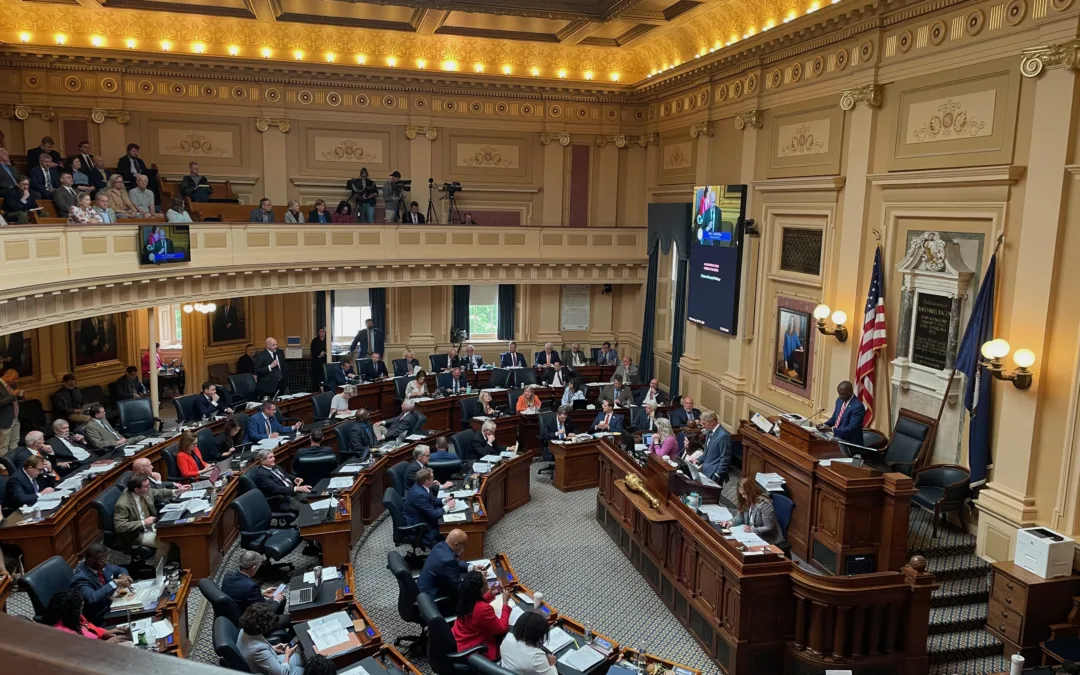
Photo by Tyler Held on Unsplash
The Regional Greenhouse Gas Initiative (RGGI) could help Virginia, but Youngkin wants out of the program.
It’s the perfect time of year to kayak Virginia’s 49,350 miles of river, enjoying the fresh outdoor air. On a warm summer day, it’s hard to imagine the commonwealth’s climate as anything but perfect.
Unfortunately, the utopia for outdoor experiences all depends on who you ask — and when. Take Danville, for example. In 2014, the river city known in part for its recreational water-based opportunities experienced an environmental nightmare when an Eden, N.C., facility owned by Duke Energy spilled 39,000 tons of coal ash and 27 million gallons of wastewater into the area’s Dan River. From just below the state line, the border-crossing river carried the toxic material 70 miles downstream. The spill “affected or potentially affected” freshwater fish, migratory birds, lands, aquatic and terrestrial plants and invertebrates, and surface waters and sediments, according to the US Department of the Interior.
Coal ash isn’t the only environmental hazard to plague Virginia over the past decade. A new nationwide survey conducted by NPR, the Robert Wood Johnson Foundation, and the Harvard T.H. Chan School of Public Health, found that more than three-fourths of adults reported experiencing extreme weather in recent years.
The National Climate Assessment found that rising seas and a hotter atmosphere contributed to more severe rainstorms and hurricanes in the southeast. Virginia’s coastline was no exception, with commonwealth coastal communities reporting two to five times more nuisance flooding than the national average in 2019. However, flooding isn’t just a coastal issue in Virginia — Southwest Virginia underwent a flood so bad last year that then-Gov. Ralph Northam visited Hurley to observe the impact.
Whether it’s related to fossil fuels, floods, extreme temperatures or otherwise, Virginia’s climate continues to face challenges.
On July 7, three Virginia legislators and a former director of science and technology in the Environmental Protection Agency’s (EPA) Office of Water participated in a virtual environment-centered panel discussion hosted by the Virginia League of Conservation Voters (VALCV). Together, the group discussed actions potentially threatening Virginia’s air, water, and other resources — and the people behind that.
All About Andrew Wheeler
Remember Andrew Wheeler, the guy the Virginia Senate took the rare step of refusing to confirm as Secretary of Natural Resources earlier this year? As it turns out, Gov. Glenn Youngkin decided to hire him anyway.
To drive the point home about just how rare of a move the Virginia Senate made, the legislative body hadn’t rejected a nominee on the governor’s cabinet since 2006. That’s when Virginia House of Delegates Republicans rejected then-Gov. Tim Kaine’s nominee, Daniel LeBlanc, the former state leader of the American Federation of Labor and Congress of Industrial Organizations — the largest federation of unions in the United States.
However, the lack of Wheeler’s confirmation didn’t stop Youngkin from finding the Trump-era administrator of the EPA a job in Virginia. In fact, he essentially created one by appointing Wheeler as the director of the newly established Office of Regulatory Management.
Yes, this is the same person who rolled back clean water protections, oversaw vehicle emissions standards weakening, and formerly worked as a lobbyist for the coal industry. Now, he’ll be in a top office in Virginia, which aims to reduce the commonwealth’s regulatory requirements by 25%.
Dr. Betsy Southerland worked for the EPA for 30 years, retiring as director of science and technology in the agency’s Office of Water in 2017. Speaking at the VALCV event, the lifelong Virginia resident said she was “stunned” when Youngkin appointed Wheeler as a special advisor.
“I was stunned because Glenn Youngkin had campaigned as a moderate Republican who would be a consensus builder. Even more stunning was the fact that Gov. Youngkin hired Wheeler at a salary $55,000 more than the acting Secretary of Natural Resources is receiving, demonstrating that he values Wheeler more than his own cabinet member,” Southerland said. “And last week, Gov. Youngkin appointed Wheeler as the director of his newly created Office of Regulatory Management, charged with reducing Virginia regulations by an arbitrary 25%.”
Southerland further cautioned that Wheeler could try to implement environmental regulations like he did nationally under Trump, but at the state level under Youngkin. She also expressed that Wheeler’s air policies could be designed to boost the profits of fossil fuel producers, “no matter how high the risks to public health and the environment.” Southerland noted further concern over Wheeler’s “devotion to fossil fuel” potentially impacting his water policies.
“Virginians must be vigilant over the next four years, watching for changes in how the state government calculates benefits and selects scientific studies to support its regulations. At EPA, Wheeler rigged the science and rigged the economic analyses in order to justify repealing or weakening public health and environmental protections that had been in place for years,” Southerland said. “As director of the Office of Regulatory Management, he will undoubtedly do the same in Virginia since one of his new duties is to enhance the benefit-cost analysis and impact analysis of state regulations.”
RGGI Report
Virginia Democratic Delegates Candi Mundon King, Dan Helmer, and Vivian Watts also expressed their concerns as guests on the virtual panel. The group broadly discussed the 2022 Regional Greenhouse Gas Initiative report, pronounced like the name “Reggie.” It’s a program Gov. Youngkin is trying to distance from the commonwealth.
“[RGGI is] a program with significant economic jobs and public health benefits, which also helps cut carbon pollution from participating states’ power plants in half, [and] would make Virginia residents pay more for their electricity,” said Sarah Ahmed, VALCV’s statewide field director. “Again, in Youngkin’s 2022 RGGI report, he claimed that RGGI would make Virginia residents pay more for their electricity, roughly an extra two dollars a month. That was one of Glenn Youngkin’s big objections to Virginia remaining in this program. It’s what Youngkin is using to justify his current plan to remove Virginia from the Regional Greenhouse Gas Initiative by emergency regulation.”
However, Ahmed noted that Youngkin remained silent about Dominion Energy’s plans to increase monthly bills by as much as 20%, due to the price of fossil fuels.
While Youngkin called RGGI a “a bad deal for Virginians,” legislators at the VALCV’s virtual event expressed differing opinions.
“[L]ike most things, the governor is uninformed and hasn’t done his homework,” Mundon King said. “RGGI has actually lowered electricity bills in participating states. And moreover, it has been a job creator as well. The bottom line for me is that the governor is not thinking of communities like mine — diverse communities who have suffered from environmental injustice. He is thinking about big corporations. And the problem with that is that it’s a narrow, shortsighted vision. And so his continued attacks on RGGI are really an attack on the health and wellbeing of all of our communities.”
Helmer noted potential political advancements in the works, including Youngkin’s recent dealings with New York and Nebraska where he met with donors and sparked rumors about a 2024 presidential run. The Virginia delegate criticized the governor for not understanding “what folks are going through.”
“[Y]ou want to make sure that you’re spouting out propaganda about the Regional Greenhouse Gas Initiative to help lock down those future presidential donors, than spending the time in our communities listening to people as they suffer from environmental degradation, as they suffer from the cost of energy, as they suffer from the cost at the pump,” Helmer said. “That’s what we’re hearing from Virginians every single day in our communities — that they are tired. They don’t understand why this governor is so focused on what other people out of this state think, and not focused enough on what folks here need, and why he is taking extreme people like Andrew Wheeler, who have sought to poison water and air across the country, and brought them here to do the dirty work right here in Virginia.”
The delegate alleged that Youngkin’s actions were a diversion.
“[Youngkin] thinks it’s a political game, and meanwhile, people can’t afford to pay the bills,” Helmer said. “We are facing a crisis everywhere — from Virginia Beach, all up the coastline, to the Potomac — brought on by climate change, which RGGI is meant to combat.”
Call To Action
In Virginia, lawmakers codified RGGI in 2020. This year, Youngkin and Republicans pushed for repeal. In Executive Order Nine, Youngkin called for a revaluation of the commonwealth’s participation in RGGI, coupled with “immediately begin[ing] regulatory processes to end it.” Ahmed challenged the legality of the governor’s actions surrounding RGGI.
“What Youngkin plans to do is unlawful,” Ahmed said. “Youngkin has asked the state Air Pollution Control Board to issue an emergency regulation to withdraw Virginia from the program. In June, Youngkin selected four new appointments to this board, effectively stacking the Air Board in his favor.”
Helmer expressed concern about the “types of people [Youngkin] thinks ought to serve in environmental positions,” using Wheeler as a prime example. He also addressed Youngkin’s RGGI-centered actions.
“The governor needs to learn how to read the law. He thinks he can do whatever he wants. He’s looking for loopholes, and the only loophole that matters is whether or not Virginians have clean air and water, they can breathe, they can drink,” Helmer said. “Instead of looking for loopholes — which arguably won’t just impact climate change, but impact smog and other chemical pollutants that are put into our environment — RGGI’s not just about climate change. I think it’s really important that we stand up and say, ‘We care about what happens in our communities. We’re tired of you playing politics with our lives.’ Because that’s what’s really going on here.”
Watts said that the RGGI challenges “couldn’t come at a worse time.” Looking back, the delegate expressed that actions to control the harmful effects of greenhouse gasses should’ve happened decades ago.
Mundon King expressed the importance of having checks and balances in place to hold the governor accountable. She also noted just how important the election process can be for decisions like the environment.
“If we want to protect our future, if we want to protect our environment, we have to go out. We have to register folks to vote,” Mundon King said. “We have to support candidates who will support RGGI, who will support our environment. And we have to be willing to fight him at every turn.”
Politics

Youngkin, Democrats to start over on budget talks
The Republican governor stood with Democratic leaders in the General Assembly on Wednesday in a bid to ease tensions over their budget debate....

VIDEO: Domestic abuse victims speak out against the gun law bills Gov. Glenn Youngkin vetoed
Senate Bill 47 and House Bill 46 aim to close the loophole that allows offenders to transfer their firearms to someone else instead of relinquishing...
Local News

Virginia verses: Celebrating 5 poetic icons for National Poetry Month
There’s no shortage of great writers when it comes to our commonwealth. From the haunting verses of Edgar Allan Poe, who found solace in Richmond's...

Join the fun: Recapping Family Literacy Night’s storybook adventures
When’s the last time you read a book aloud with a loved one? If it’s difficult to answer that question, then maybe it’s time to dust off that TBR...





